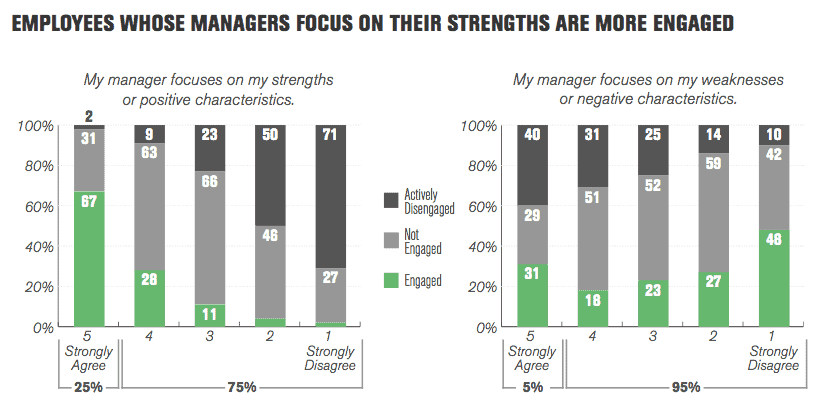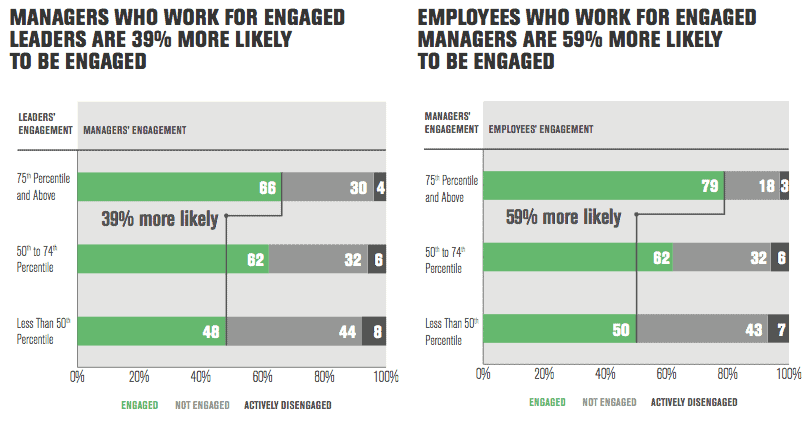It's a common scenario: The company you work at is growing. Suddenly, a new layer of management is created, and thus a new role opens up. Leadership in the company wants to promote internally, so you and a number of your peers apply.
Only one person can get the job and now that you have it, your peers report to you. Awkward.
Managing former peers can be okay if you have a strong relationship with them; they may even been rooting for you, or felt you were most deserving. Those people will be genuinely happy for you, and ready to follow you.
Unfortunately, it's not all sunshine and rainbows.
There's likely to be at least one person who resents you. They wanted the job. They may think they can do a better job. They may not have liked you before, and now they really don't like you. They may passively or actively undermine you as a leader.
You may also feel uncomfortable as people who were your peers, who you commiserated and socialized with now report to you. The awkwardness can easily go beyond the walls of your office as your friendship has to switch between "friend-mode" and "manager-mode" on a regular basis.
Here's a few approaches you can use when you face these challenges in managing peers after promotion:
Table of Contents - What to do when you're managing former peers
- Take the awkwardness head on
- Use your previous role to your advantage
- Make your new responsibilities clear
- Accept they may need to move on

How to Approach Managing Former Colleagues
As a leader, the example you set is critical, so the first thing you should do is to relax and be confident.
Remember: Your company chose you because they believe you are the best person for the job. Embrace that and use those feelings to help you take on these challenges - and you'll find managing former colleagues is not so scary after all.
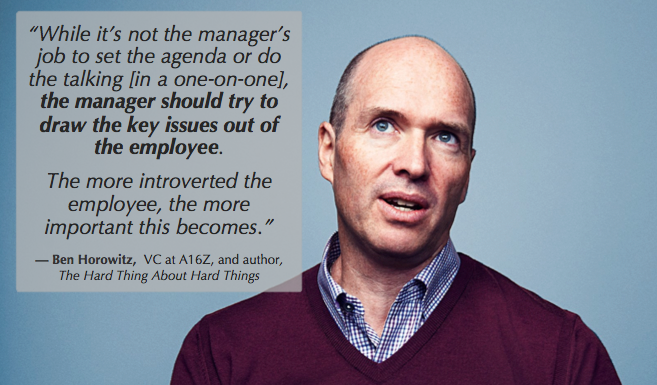
1) Take the awkwardness head on
There's no avoiding it. There's going to be some awkwardness in your new role. So why not take it head on?
Your one on ones are a great time to clear the air. Let your former peers vent. Listen. Ask good questions and get their opinions.
Often, people just want to feel heard. By letting them air any grievances and talking about how they feel, you can then work together to address the awkwardness. Whether that's because they also wanted the job or they're not sure how this affects your friendship, you will be creating a dialogue around the issues that naturally arise when managing former peers. You'll be removing the elephant from the room right away.
Remove the elephants when managing peers after promotion
As Sheryl Sandberg wrote about handling tough conversations with her team after her husband's death,
"Once I addressed the elephant, we were able to kick him out of the room."
If you come with an open mind, you may discover valuable insights. For instance, if they thought they were a better choice for the role, ask what weaknesses in your leadership style you could improve? This can both make you a better leader by learning what they thought you were lacking, while also showing you're listening to them.
It also sets the expectation that just because you're the leader doesn't mean you won't take their input.
As Ed Catmull wrote of the value of candor in management:
"Candor isn't cruel. It does not destroy. On the contrary, any successful feedback system is built on empathy, on the idea that we are all in this together, that we understand your pain because we've experienced it ourselves.”
Having the courage to take on these awkward questions right away sends a strong message on how you face challenges and value their input. This is a great way to build your new manager-team member relationship with them.
Further reading:
- We wrote more about addressing the elephant in the room when managing former peers in our Ask Lighthouse column.
- Learn how to get your team to open up in your one-on-ones.
- Brand new to management and don't know where to start in your 1:1s? We have a list of 150+ great questions to ask your team members.
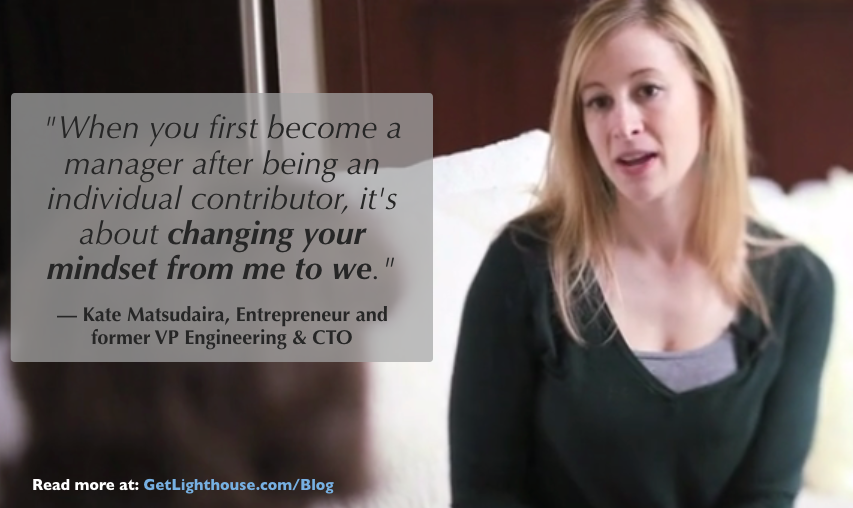
2) Use your previous role to your advantage
If you have been working with your peers for a long time, you probably know them pretty well. That means you know their strengths and weaknesses, and you can set them up for success. Delegate work that you know they can do well and give them the trust and autonomy to do it.
This isn't just logical; it's backed by research. As Gallup found in their "State of the American Manager" research, when people have the chance to work on their strengths daily, they're significantly more engaged:
Deloitte found similar, powerful benefits:
"…almost all the variation between high- and lower-performing teams was explained by a very small group of items. The most powerful one proved to be "At work, I have the opportunity to do what I do best every day.”
Business units whose employees chose "strongly agree” for this item were 44% more likely to earn high customer satisfaction scores, 50% more likely to have low employee turnover, and 38% more likely to be productive.”
Furthermore, this can be a great olive branch. No, they didn't get the promotion you received, but you can give them a great project or responsibility they're excited about.
Even if they're resentful, this can help melt away some of those feelings knowing you have their interests at heart. That's why emphasis on open communication is key when managing former colleagues.
This is also a primary reason why peer one on ones are so powerful.
You build these relationships before you need them, and then are just transitioning a habit you already had into a more frequent manager-team member conversation. Even better, you'll have more power to do something about problems you may have previously only been able to commiserate on.
With that in mind, consider looking for new peers to connect with at your new level to get advice and build more valuable relationships going forward.
Further reading:
- Peer one-on-ones a great way for you to grow - read our guide to learn more about their power.
3) Make your new responsibilities clear when managing former colleagues
Unfortunately, once you get a promotion that has you managing former peers, you’ll have to accept that there will be changes to your relationships. You can no longer have close, personal friendships the way you might have had them previously.
To be able to lead effectively, and to be respected as the leader now, you’ll need to walk the fine line of staying professional, and still caring about your team. The video above of former Twitter CEO, Dick Costolo captures this concept well.
Being their manager means you have to change.
In an interview he gave to Harvard Business Review on this issue, Rober Sutton, author of the No-Asshole Rule, says: “It’s tough. The dynamics completely change. People start to watch you more than ever before.”
Michael Watkins, chairman of Genesis Advisers, agrees: “You can’t continue to have relationships in the way you did before. This is a loss for everybody but it’s part of the deal.”
If you don’t make changes to the way you work with your team, you can run into common leadership challenges including:
- Decisions being made without your input or even being notified.
- Discussions that have been closed could be reopened.
- Buy-in for changes you want to make may be harder to get.
- When you have critical feedback, they may not take it seriously.
- You may struggle to moderate and lead discussions and debates with your team.

Create clear boundaries when managing former colleagues
To avoid these issues, you need to work on establishing clear boundaries between you and your team members.
Now, this doesn’t mean you should be completely aloof, or become a super strict boss going forward. It just means that you might need to slightly readjust your mindset.
As we covered in the previous 2 points, you’ll want to work on putting yourself at arms length from your former peers. You can do this both in your words and actions with things like:
- Do not drink at company social events to show you have responsibilities still there.
- Communicate decisions with your team in a formal manner that reminds them you’re not their peer nor buddy, but their manager now.
- Specifically talking about the change, and what it means for your relationship at work, and any personal relationship outside of work.
The last point is particularly important; you don’t have to stop being friends with former peers simply because you’re their manager. However, you do have to create more clear lines with them.
Let your friends at work know that when you’re at work you have to be serious and professional, and that you want to emphasize a clear separation if you’re spending time together outside the office.
One of the easiest ways to do that is to ask that when socializing “off the clock” you don’t talk about work, so it’s clear you’re just yourself there. Then, at the same time, at work you don’t talk about some of the fun, casual things you do at home. This separation of church and state can help you both stay in the right mindsets in both situations.
Further reading:

4) Accept they may need to move on
Ultimately, not everyone may work out. If they're too bitter about the situation, then even your best efforts may not turn them around. It's not your fault - managing former colleagues is a really challenging situation.
As Jim Collins's classic book, Good to Great, discusses, you need to get everyone "On the Bus.” As he puts it:
"The leaders who ignited the transformations from good to great did not first figure out where to drive the bus and then get people to take it there. No, they first got the right people on the bus (and the wrong people off the bus)”
Make the best effort you can, but recognize it's a two way relationship: they have to be willing to come around, too.
If they're not meeting you halfway despite your best efforts over time, tell them. Have a frank conversation in your one on ones with them about if they're going to be able to be successful in their current role or if they'd be happier pursuing the same kind of opportunity elsewhere.
No matter how talented someone may have been before your promotion, if they're now creating a toxic, negative environment, or you feel you cannot trust them because they undermine you, you have to make a change. This is especially true if they are a manager.
Managers impact their entire team's attitudes.
Gallup has found a manager's attitude and level of engagement directly impacts the engagement of their team:
This means their lack of happiness and attitude will infect their team, costing you all of their productivity and risking turnover for everyone.
Give it a few months to try and see how you're working hard to help everyone on the team. If they still aren't cooperative, then you should be candid with them about applying for jobs elsewhere that would make them happy, or let them go.
On the flip side, don't give up on anyone too soon; if it was a close call between you and them, give them space and focus on those who are willing to work with you.
Fear of missing out is powerful, especially when a manager may realize they're hurting their whole team by fighting you instead of collaborating. If they see you helping others and acting in everyone's best interests, they may come around. It just may not be overnight.
Further reading:
- They may not have gotten the promotion they wanted now, but you can help them get it later:
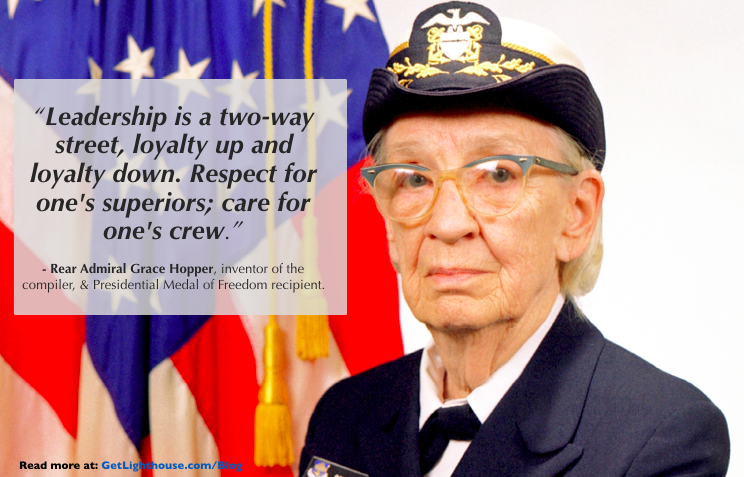
Managing former peers requires courage
The key to handling any uncomfortable situation is to not ignore it. Engage your team and find ways to solve the problem.
Talking about tension from manager peers after promotion, and taking action based on what you learn are the only ways any situation will improve. That's true whether that's setting clear borders on your friendship while in the office, or helping someone get over the sting of being passed over for a promotion.
For more advice on what to do as a new manager, check out this episode of our Creating High Performing Teams podcast with Mike Pretlove. We talk about pitfalls to avoid, the right frequency of feedback, and some more key do’s and don’ts for first-time managers:

How do you transition to managing peers?

To transition to managing former peers as smoothly as possible, it’s advisable to follow these 4 important steps:
- Take awkwardness head on: Managing former peers is always awkward, so it’s important to face it head on and address it.
- Use your previous role to your advantage: If you’ve been working with someone you start managing for a while before, you probably know their strengths and weaknesses very well. Use that knowledge.
- Make your new responsibilities clear: When you start managing former peers, your relationship will change. There’s no way around it.
- Accept they may need to move on: There’s no guarantee managing former peers will work out. Sometimes they can’t look past the awkwardness and need to change jobs. You have to accept that.
How do you supervise former co workers?

Managing former peers has its strengths and weaknesses, but more often than not, it’s an awkward situation that needs a healthy balance between stern professionalism and compassion for your former work friends.
There are huge advantages when supervising former co-workers, though: If you worked closely with them in the past, you are probably very much aware of their key skill sets, as well as their strongest talents and weaknesses. If you play it smart, you can use this knowledge to your advantage and help them work their best.
What tips can we offer new managers who are now supervising their former peers?

- Managing former peers will always feel awkward. There’s no way around it: Address it with your former co-worker and let them vent if they need to.
- You probably know your new team members better than any manager before you if you worked closely with them in the past. This is an absolute advantage.
- Separate your personal relationships with your professional ones.
- Your relationship to former work friends will never be the same. Make your position of leadership clear when managing former peers.
How do you manage the team you were a part of?

Transitioning from team member to team lead is never easy, especially when the team you start supervising consists mainly of former co-workers. There is no way around it: your professional relationships will change, and you will need to make your leadership position clear if you want to be taken seriously as a manager, rather than a former work friend.
However: Managing former peers can give you an absolute advantage that no other manager before you had. You probably worked closely together on a pivotal project in the past? Maybe you had to band together and crunch your work hours to succeed at the very last minute? That means you probably know your new team member’s major talents very well and are aware of the k
What is the first thing to do when managing former peers?

The first thing you should do is address the big elephant in the room: Being managed by your former work colleague IS awkward. There’s just no avoiding it, so why not take it head on?
Your one on ones are a great time to clear the air. Let your former peers vent. Listen. Ask good questions and get their opinions. Often, people just want to feel heard. Addressing the inherent awkwardness head on will make managing former peers that much easier.



